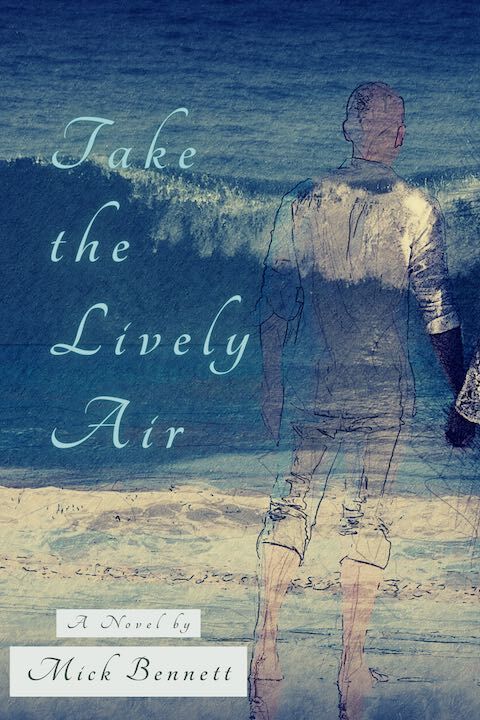Title: Take the Lively Air
Author: Mick Bennett
Publisher: Unsolicited Press
Genre: Literary Fiction
First Publication: 2023
Language: English
Book Summary: Take the Lively Air by Mick Bennett
In Take the Lively Air, a minor traffic collision escalates into a confrontation between two families haunted by their pasts and apprehensive of their futures. Rage and regret butt heads against the background of America’s toxic cultural climate. But saner voices discover that human frailties are best viewed through the microscope of compassion, and our common humanity must be acknowledged to make way for our futures.

Book Review: Take the Lively Air by Mick Bennett
Take the Lively Air tells the story of Riley Walker, an English professor in his third decade of teaching who is struggling with grief and loss following the death of his wife Helen 13 years prior. On a Saturday morning drive in his Jeep Wrangler, Riley gets into a minor traffic accident with Cloyd Burkett, a local man known for his quick temper and love of firearms. Both men were injured in the collision and taken to the hospital.
Cloyd’s wife, Darlene, blames Riley for Cloyd’s injuries and vows revenge. Riley finds himself the target of threats from Darlene and her family. He goes into hiding to protect himself. In the midst of this, Riley meets Molly, a woman who is also grieving the loss of her husband and caring for her adopted grandson, Klyde. Riley and Molly bond over their shared experiences and begin a relationship.
Take the Lively Air by Mick Bennet explores profound themes of grief, loss, forgiveness, and reconciliation through the interweaving stories of two families in a small Jersey Shore town. After a minor traffic accident escalates tensions, Riley Walker and Cloyd Burkett must confront their own personal pain while navigating a dangerous cycle of retaliation. Alongside their partners, Molly and Darlene, they grapple with how to overcome division and build a shared future. Through dynamically drawn characters and a vivid sense of place, Bennett offers a nuanced examination of individual struggles and society’s challenges with empathy, insight, and hope.
Character Analysis
In Take the Lively Air, Bennett fully develops complex characters, granting an understanding of their diverse lived experiences with grief and anger. Riley Walker teaches English at the local community college but remains haunted by survivor’s guilt since his wife Helen’s death years prior in a car crash. Though sincere in helping others process loss, Riley isolates himself in self-loathing and denial about moving forward alone. When he collides with Cloyd’s truck, Riley’s pain resurfaces, and he panics about facing another investigation into his culpability.
Cloyd Burkett comes across as gruff yet vulnerable, simmering with rage yet desperate to maintain his stoic rural masculinity. As a working-class father seriously injured in the accident, Cloyd feels emasculated and lashes out to reassert control. His wife, Darlene, protective yet volatile in her own grief over possibly losing Cloyd, fuels the family’s vendetta against Riley. Yet Bennett ensures the reader understands how unchecked trauma has warped their perspectives without condoning their hostility.
A brightness arises through Molly, who recently adopted her unstable son’s preteen boy, Klyde, after years of turmoil. Warm yet wary, she nurses deep wounds from her ex-husband’s betrayal and son’s addiction struggles. Klyde himself displays perceptiveness beyond his years from a tumultuous upbringing. Their balanced resilience and Riley’s caring companionship indicate hope for healing communal fissures. Bennett fleshes out all characters with nuance and empathy, which elevates Take the Lively Air above reductive stereotypes.
Setting and Social Commentary
Bennett saturates Take the Lively Air with a vivid sense of place in a downtrodden Jersey Shore community. Descriptions of Ocean Avenue, the boardwalk bustle, and locals enhance the intimate setting. These details rooted in everyday reality generate profound tension when darker currents rise, from rising xenophobia to toxic masculinity, mirroring current sociopolitical divides.
Yet Bennett avoids simplistic critiques, honing in on how universal struggles like sustaining meaningful connections or grappling with mortality fuel polarization. When characters confront their limitations and common humanity despite differences, hope emerges for bridging gaps. For example, after her son’s cultural appropriation incident strains his relationship with Klyde, Darlene recognizes the complexity of intolerance rather than retreating into reactionary persecution. Bennett subtly underscores our shared capacities for both conflict and cooperation.
Themes of Grief, Forgiveness, and Reconciliation
Grief lies at Take the Lively Air’s core, manifesting through varied expressions from avoidance to hostility to compassion. Riley remains mired in self-recrimination, while Darlene protects hers through aggression. Yet Molly models constructive grieving by nurturing new life despite irrevocable losses. Bennett indicates grief’s nonlinear navigation, only overcome through radically accepting the continuum of emotions and ourselves as works-in-progress.
Interwoven with grief arises forgiveness as an act of courage rather than weakness. Riley must forgive himself for Helen and absolve Darlene to stop the feud’s escalation, while Darlene learns nuance in forgiving Klyde. Only through dispelling festering resentment can characters embrace survivorhood’s responsibilities of renewing community bonds. Not dismissing harm, Bennett underscores how forgiveness transforms victims and perpetrators alike toward redemption.
Ultimately Take the Lively Air champions reconciliation, the arduous process of mending broken relationships and divided societies. After reaching emotional breaking points, characters choose dialogue over violence, empathy over accusation, and cooperation over conflict. Their negotiating shared pain toward mutual understanding demonstrates healing’s difficulties yet proves humanity’s capacity to integrate opposing viewpoints for common welfare. Bennett closes on a hopeful note that acknowledging our interdependence can nourish cooperation.
Conclusion
In weaving moving portrayals of personal journeys with timely commentary on societal divisions, Take the Lively Air emerges as a deeply felt, thought-provoking work. Mick Bennett crafts dynamic characters wrestling with profound themes of grief, forgiveness, and reconciliation with nuance and care. Situating their intimate struggles within a vividly drawn small town, he underscores our universal capabilities for both conflict and compassion. Bennett’s deft characterizations keep the plot driving forward through personal discoveries and interactions rather than info dumps. Readers stay immersed in the emotional turmoil and moral dilemmas of the characters rather than detached observers of unfolding events. Their growing rapport anchors the narrative’s emotional core. In a period crying out for empathy, understanding, and unity, Take the Lively Air shines as an uplifting, invaluable contribution, reminding us of our shared humanity. Bennett’s gifts for insight, emotional acuity, and a hopeful message resonate long after the novel concludes.





